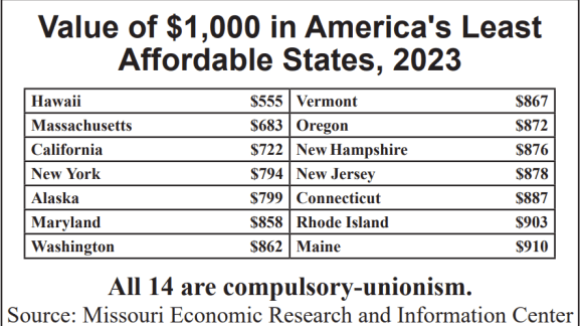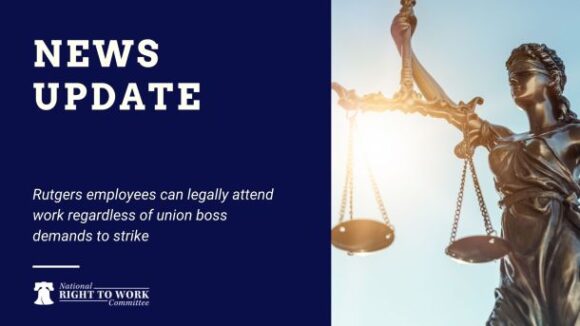Banning Compulsory Dues Curbs Cost of Living
On average, forced-unionism states are 23.2% more expensive to live in than Right to Work states. And decades of academic research show that compulsory unionism actually fosters a higher cost of living.
On September 24, the National Labor Relations Board (NLRB) issued the latest of a series of decisions finding that bosses of Local 8 of the International Longshore Workers Union and the ILWU itself commenced ordering illegal employee slowdowns at the Port of Portland in Oregon in June 2012.
Portland Oregonian reporter Molly Harbarger summarized why ILWU bosses are engaging in economic warfare in an October 1 news article (see the link below to read the whole thing):
The longshoremen and port operator ICTSI Oregon have been clashing for years, starting shortly after the Port of Portland hired ICTSI Oregon to take over operations at its container terminal.
In 2012, longshoremen claimed ICTSI Oregon should give two jobs plugging, unplugging and monitoring refrigerated containers to them, taking the work away from an electricians union.
ICTSI Oregon head Elvis Ganda said that the company’s contract with the Port of Portland stipulated that since the electrician’s union was doing the work before he took over, he must continue assigning the work to them.
Eventually, that claim was supported in court.
That altercation set off claims and counterclaims between the longshore union and the port operator. Finally, an administrative law judge for the labor board ruled that the longshore union had intentionally slowed their work and made threats to pressure ICTSI Oregon to reassign the work.
In March, a federal judge ordered both the San Francisco-based headquarters and local 8 of the ILWU to pay nearly $60,000 in fines for violating a court order to resume work relating to the 2012 case.
The evidence that slowdowns at Terminal 6 of the Port of Portland have been orchestrated by ILWU kingpins is overwhelming. One professional analysis cited in a 2014 ruling by NLRB Administrative Law Judge Jeffery Wedekind reported that the “productivity of every crane and nearly every crane operator” at the terminal “remained depressed” throughout the entire period of investigation. It’s all but impossible to believe this happened by coincidence.
Though the NLRB has only officially found ILWU bosses culpable of ordering illegal work slowdowns in 2012, the record shows grave problems caused by hate-the-boss class warfare have persisted, year after year. As Journal of Commerce Senior Editor Bill Mongelluzzo explained in an October 2 analysis:
The ILWU’s relentless campaign of work slowdowns, shorting ICTSI of labor and walking off the job dozens of times over the past three years took a lethal toll on Portland’s container business. After warning the ILWU, ICTSI and the port that they could not tolerate low productivity forever, Hanjin Shipping Co. and Hapag-Lloyd earlier this year pulled out of Portland, taking with them 99 percent of the port’s container business. All that is left now is vessel call each month by Westwood Shipping.
But even though their tactics have already cost rank-and-file ILWU-“represented” employees a substantial amount of work in addition to being ruled illegal by NLRB officials again and again, ILWU bosses in the Northwest remain defiant. In an angry statement following the NLRB’s September upholding of an NLRB judge’s decision that the union brass had broken the law, ILWU Coast Committeeman Leal Sundet publicly stated his view: NLRB orders that he and his cohorts cease and desist are “not enforceable or binding.”
So far the NLRB and the federal court system really do appear to be powerless to deter illegal job actions at the Port of Portland. The problem is that, even though intentionally slowing down work and punishing ICTSI over a job assignment decision it doesn’t even control are both technically illegal, federal labor law as a whole looks kindly on union bosses who resort to militant tactics.
As the late jurist and legal scholar Robert Bork wrote back in the 1960’s, the National Labor Relations Act (NLRA) favors the “organization of employees into fighting groups.”
And more than any other provisions, the NLRA provisions empowering Big Labor to foist “exclusive” union representation on all employees, including union nonmembers as well as members, in a government-delineated “bargaining unit” promote strife in the workplace.
The judicial process is ill-equipped to handle the abuses the NLRA fosters. The genuine solution is to reform the NLRA itself by removing its pro-union monopoly provisions.


On average, forced-unionism states are 23.2% more expensive to live in than Right to Work states. And decades of academic research show that compulsory unionism actually fosters a higher cost of living.

Big Labor Michigan politicians like Betsy Coffia arrogantly dismiss the expertise of independent-minded workers

Rutgers employees can legally attend work regardless of union boss demands to strike